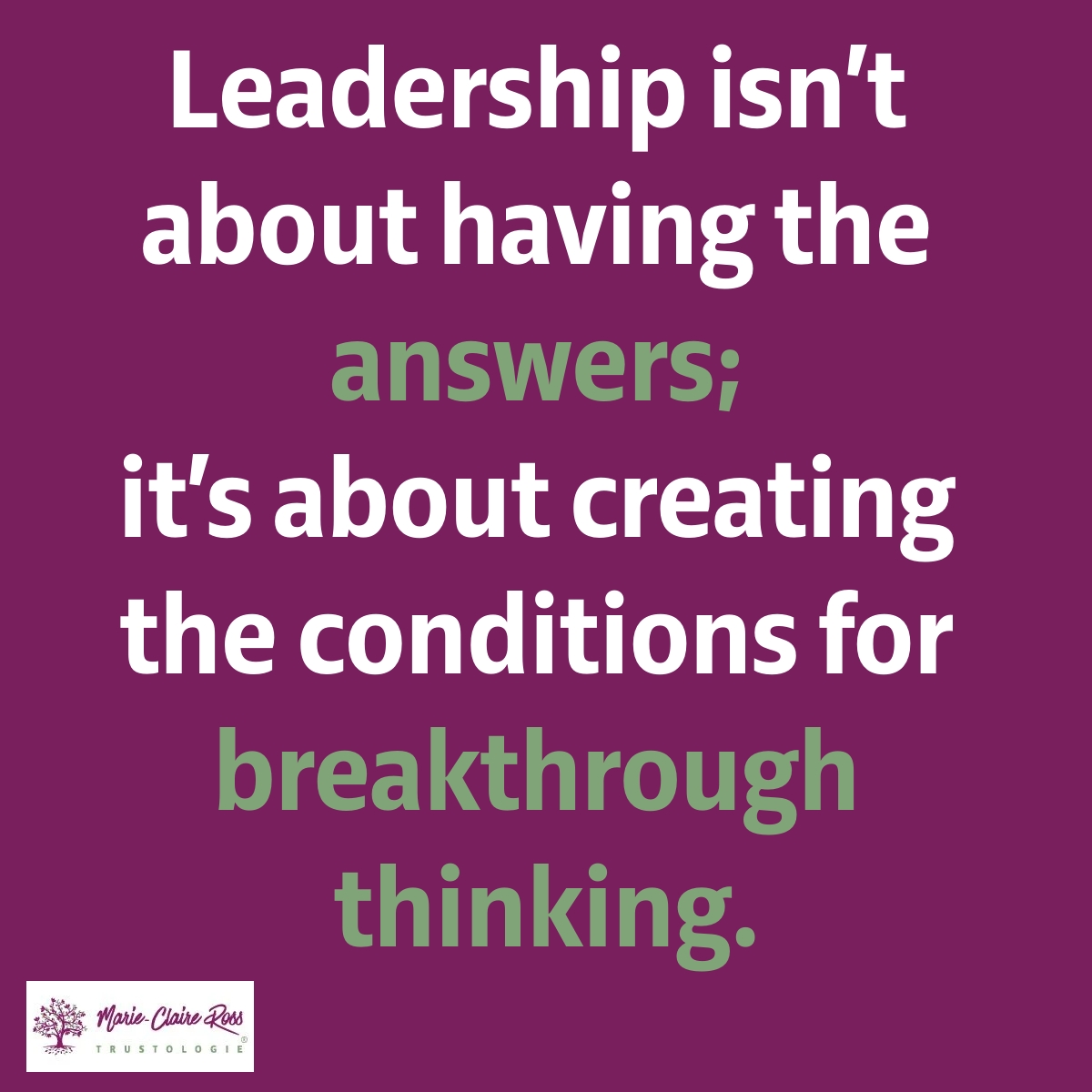8 min read
Beyond the "Why": 5 Coaching Secrets to Unlock Curiosity in Leadership
When my daughter was 17 months old, she discovered a superpower: the word “Why?”For the next two years, it was her response to almost everything.
Develop leaders, strengthen executive teams and gain deep insights with assessments designed to accelerate trust and performance.

Transform how your leaders think and perform with keynotes that spark connection, trust and high-performance cultures.

Explore practical tools, thought-leadership and resources to help you build trusted, high-performing teams.

Trustologie® is a leadership development consultancy founded by Marie-Claire Ross, specialising in helping executives and managers build high-trust, high-performing teams.

4 min read
Marie-Claire Ross : Updated on January 21, 2026

Leading oneself is the foundation upon which effective leadership is built. Without self-leadership, it becomes difficult to inspire and guide others towards shared goals and objectives.
After all, if you can't lead yourself first, you will have issues with getting others to follow you.
Leading oneself is the foundation upon which effective leadership is built. Without the ability to manage oneself, it becomes difficult to inspire and guide others towards shared goals and objectives.
After all, if you can't lead yourself first, you will have issues with getting others to follow you.
Let's take a look at nine things to lead yourself better.
Self-leadership starts with knowing yourself. It's about taking the time to learn about who you really are and how that defines you as leader. Learning about yourself ensures that you can more successfully undertake steps 2-9.
It involves working on your intrapersonal (“within the self”) skills. These are our internal abilities and behaviours that help us manage our emotions, cope with challenges, work within deadlines and learn new information.
Self-awareness requires work and commitment. And you're never done. It's a lifelong process. And it is the job of a great leader. It's also why so many successful leaders have a leadership coach (just like athletes) to pull them through.
But you can start by unpacking a personality assessment, working out your strengths and weaknesses and getting feedback on your performance.
There can be lots of reasons why we don't trust ourselves. Sometimes we make a mistake and receive heavy criticism. Other times we fall into people-pleasing territory, need a lot of validation, suffer from imposter syndrome, have a fear of disappointing others or being ostracised.
Whatever makes you distrust yourself, the most important thing is to learn to trust yourself to be a leader. Otherwise, you will struggle to make decisions, lead authentically and reduce people's confidence in you.
Discovering your purpose is invigorating. It offers you a clear path to make informed decisions that shape your life - both personally and professionally. It's the driving force that motivates you to jump out of bed each morning, knowing that you are pursuing what truly ignites your passion.
It also helps with clarity which is critical for clear communication.
Defining your leadership vision establishes the path and objectives for your team. It serves as a succinct and inspiring declaration of the why behind your leadership rather than the how. It's about knowing your leadership style and working with your innate skills, not against them. Your leadership vision can also be aligned with your quarterly leadership development goals, guiding your continuous growth and impact.
Core values serve as the guiding principles that shape your decision-making process. They act as a compass, aiding you in navigating through life's challenging choices, and are steadfast and unwavering in their influence.
Emotional self-regulation is the ability to recognise, understand, and manage emotions, and to channel those emotions into productive ways of thinking and acting.
Self-regulation is key to great leadership. After all, no-one wants to work with a boss that can't control their anger or frustration. It also plays an important part in your psychological fitness and being able to fully unleash your brain's potential.
Leaders who effectively manage their emotions have learnt to self-soothe and know that all will be well.
Knowing when you work the most productively and working with your body is important. This means scheduling meetings when you are at your most efficient or tackling tasks at the right time of day for you. For example, for many of us, tackling difficult work is better done first thing in the morning, while after lunch tasks are better suited to admin, when our brains seem to be working slower.
It also means being able to best prioritise and plan tasks appropriately. After all, those around you will distrust your leadership if you miss deadlines or appointments.
Taking care of our bodies is essential for a fulfilling life. In a professional context, this involves avoiding overwhelming ourselves, prioritising breaks, taking time off, ensuring adequate rest, and nourishing ourselves with wholesome foods.
Moreover, it entails cultivating interoceptive awareness. This involves tuning into the cues our bodies provide and acknowledging our instincts. For example, if you like to run, you might realise that a certain muscle pain in your calf means it's time to visit your physiotherapist. Scheduling time to have an appointment ensures that you reduce the likelihood of getting injured.
This practice is crucial as there is a growing consensus in the scientific community about the vital role of a strong brain-body connection in optimising executive function.
This is probably what you don't want to hear, but it's really what bookends these steps. And that is having the willpower to look at yourself and make improvements. It means getting up early to exercise. It requires having the cognitive control to do the rights things - for yourself and others.
Cognitive control enables executives to pursue a goal despite distractions and setbacks. The same neural circuitry that allows such a single-minded pursuit of goals also manages uncontrolled emotions. Good cognitive control can be seen in people who stay calm in a crisis, manage their own inner turmoil, and recover quickly from a debacle or defeat.
Years of extensive research highlight the crucial role of willpower in achieving leadership success. Furthermore, being disciplined ensures you are accountable to yourself, so that you.
Working on personal goals and achieving them is one way to improve your personal growth that can flow onto your personal life.
Knowing, and leading yourself better, means that you lead yourself more authentically. It sets a great foundation for improving your interpersonal skills. We are all drawn to leaders who speak the truth, confess to mistakes or stay calm during a crisis.
The good news is you don't have to do this yourself. In my Tribe of Trusted Leaders Leadership Development program, I take leaders on a journey to learn about themselves, in order to improve self-leadership. This includes understanding themselves through an Enneagram assessment, knowing their purpose, values, leadership vision, leadership development goals and their leadership style.

8 min read
When my daughter was 17 months old, she discovered a superpower: the word “Why?”For the next two years, it was her response to almost everything.

11 min read
I have a friend who often finds herself at the mercy of her emotions. Recently, she called me to rehash a confrontation she’d had with a group of...

9 min read
True leadership presence isn’t a performance or a set of charisma hacks; it is the felt experience of who you are being in the room. By cultivating...

In today’s pressure cooker business world, there is greater uncertainty and risk for people and organisations. It’s during these turbulent and...

Recently, one of the biggest complaints that I have been hearing about leaders is how a lack of self-awareness is impacting their performance....